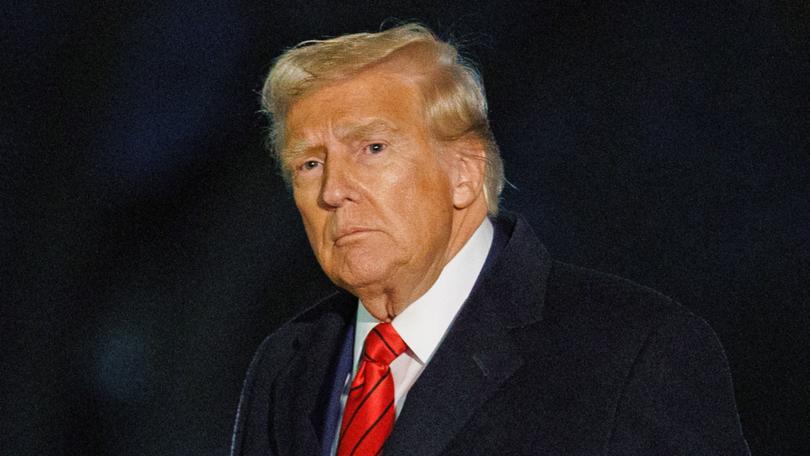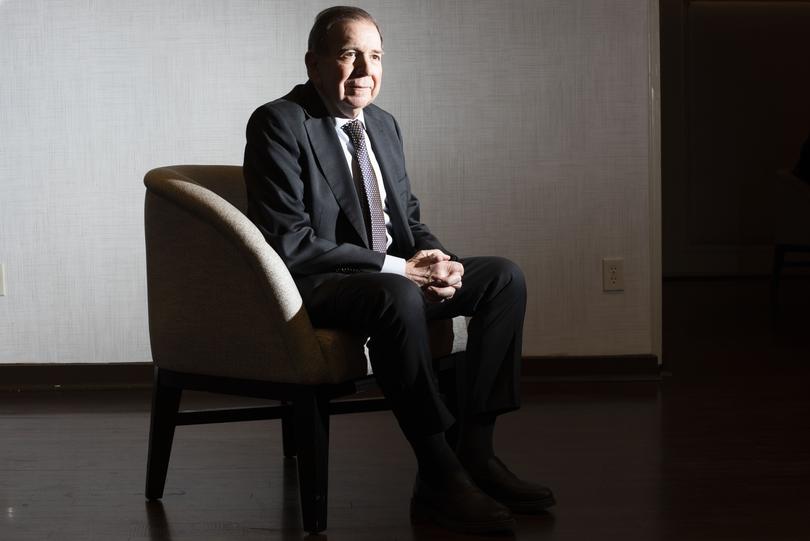US President Donald Trump to send hundreds of thousands of Venezuelans back to Maduro’s repressive state

The government of Nicolás Maduro will take in Venezuelans who are deported by the United States, President Donald Trump said Saturday, potentially clearing the way for hundreds of thousands of immigrants from the South American country to be sent back to the authoritarian socialist regime that many fled.
The Trump administration has said it is prioritizing the return of criminals and gang members, but the deportees could eventually include hundreds of thousands of Venezuelans with temporary protected status that is set to expire later this year.
“Venezuela has agreed to receive, back into their Country, all Venezuela illegal aliens who were encamped in the U.S., including gang members of Tren de Aragua,” Trump wrote Saturday morning on Truth Social. “Venezuela has further agreed to supply the transportation back.”
Sign up to The Nightly's newsletters.
Get the first look at the digital newspaper, curated daily stories and breaking headlines delivered to your inbox.
By continuing you agree to our Terms and Privacy Policy.The details of the arrangement, including the logistics of Venezuela’s offer of transportation, were not immediately disclosed. Human rights advocates and Venezuelan opposition politicians have warned against repatriating the citizens of a country that under Maduro has been an economically failing, politically repressive pariah state.

More than 7.7 million Venezuelans have fled the country since Maduro took office in 2013. Most settled in Latin America and the Caribbean, but since the pandemic, migrants increasingly have sought refuge in the United States.
Criminals are often ineligible for humanitarian protection in the United States and have been a priority for deportation for years. Immigration officers deported 3,256 people to Venezuela last fiscal year, up from 327 in fiscal 2019 during Trump’s first term.
The focus on deporting Venezuelans marks a reversal for the Trump administration. The president offered most Venezuelans reprieves from deportation shortly before the end of his first term, saying the situation in their country was “catastrophic.” Secretary of State Marco Rubio, when he was a U.S. senator, said in a 2022 letter that deporting Venezuelans would be a “death sentence.”
Trump’s announcement came a day after his special missions envoy met with Maduro in Caracas. Richard Grenell returned from the visit with six Americans who had been detained in the aftermath of Venezuela’s July presidential election.
U.S. officials and others have said Maduro lost the election; a Washington Post analysis of voting receipts showed that opposition challenger Edmundo González probably won by a 2-1 margin.
While the Trump administration cast the Americans’ return as a diplomatic victory, critics of Maduro said the unusual decision to honor the Venezuelan president with a visit in Caracas by a senior U.S. official would only help legitimize his regime.
The United States has recognized González as Venezuela’s president-elect, but the opposition candidate has fled the country under threat of arrest and is now trying to build support from exile. A deportation deal with Maduro, he told The Washington Post last month, would allow the autocrat to “use returning Venezuelans to his political advantage.”
Mauricio Claver Carone, the State Department’s special envoy for Latin America, said Friday that there would be no deal.
“This is not a negotiation,” he told reporters. “The Venezuelan criminals of Tren de Aragua and other groups have to be deported and Venezuela has to accept them. It is their responsibility … it is not negotiable. … And if they don’t comply with these requirements, obviously, as President Trump himself has said, there will be major consequences.”
Under the Biden administration, the Treasury Department allowed Chevron, the main U.S. oil company with operations in Venezuela, to restart production and sell the Venezuelan oil it pumps to the United States. U.S. and European companies are also now allowed to provide the chemicals, previously supplied by Iran, needed to extract Venezuela’s heavy crude.
Venezuela hawks within the Trump administration, includingRubio, have long called for tighter sanctions against Venezuela’s oil industry.
Yet Maduro appeared pleased with how Trump’s early overtures are playing out.
His government celebrated Grenell’s visit - the highest-level meeting between the United States and Venezuela in years - sharing images of the men shaking hands and declaring a “new beginning in bilateral relations.” The sides discussed migration, the “negative impact of economic sanctions against Venezuela, U.S. citizens involved in criminal offenses within Venezuelan territory, and the integrity of Venezuela’s political system,” the government said in a statement.
White House press secretary Karoline Leavitt said Friday that Grenell’s visit did not mean the United States now recognized Maduro as Venezuela’s legitimate president.
Grenell, she said, had “two very clear directives: make sure that Tren de Aragua members, of which there are 400 currently in custody, are repatriated back to Venezuela, and that all United States detainees return home.”
Venezuelan officials have said at least nine U.S. citizens have been arrested since the election. After the release of the six who returned Friday with Grenell, at least three remain unaccounted for.
Venezuelans are by far the largest group protected from deportation under a 1990 law that allows U.S. officials to grant undocumented immigrants temporary protected status if their countries experience crises such as war or natural disaster.
Homeland Security Secretary Kristi L. Noem this past week rescinded an 18-month extension of that status for about 600,000 Venezuelans in the United States. Her predecessor, Alejandro Mayorkas, had granted the extension days before leaving office, saying the immigrants should be allowed to remain in the United States through October 2026 because their home country was mired in economic and political turmoil.
Noem was expected to decide Saturday what to do with a large group of those migrants whose legal status is now set to expire in April.
“They were going to be able to stay here and violate our laws for another 18 months, and we stopped that,” she said on “Fox & Friends.”
